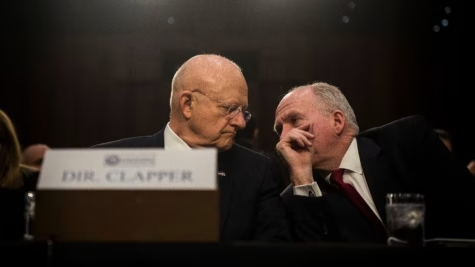In 2024, a significant controversy erupted surrounding a letter signed by 51 former intelligence officials, which aimed to discredit the Hunter Biden laptop story as Russian disinformation during the 2020 election.
Recently, Presidential candidate, RFK discussed the scandal and got social media trending again over public discussions:
Republicans started calling for action in 2023. They are moving to effectively strip security clearances from any intelligence or defense official who signed the statement.
We covered that story and now have an update.
The letter’s origin is generally attributed to Tony Blinken:
The letter, published shortly after the story broke in October 2020, suggested that the laptop’s content bore the hallmarks of a Russian information operation. The signers included prominent figures from the intelligence community, such as former CIA Directors John Brennan and Leon Panetta, and former Director of National Intelligence James Clapper.
The mainstream media reported that the narrative to discredit President Trump often:
In the Politico article, they reported that over 50 former senior intelligence officials signed a letter expressing their belief that the release of emails purportedly belonging to Hunter Biden, published by the New York Post, bore the characteristics of a Russian information operation.
While the signatories did not provide new evidence, they pointed to factors within the story that they felt resembled past Russian disinformation tactics. They reported their intent was to alert the public, asserting that if their suspicions were correct, the operation aimed to manipulate American voters and undermine Joe Biden’s candidacy.
Joe Biden pushed that message himself on the campaign trail:
In response to the letter, Director of National Intelligence John Ratcliffe disputed the notion that the laptop’s contents were part of a Russian disinformation campaign, although the FBI was reportedly investigating potential foreign involvement. The New York Times raised doubts about the rigor of the Post’s reporting process, revealing internal concerns among its staff about the authenticity of the materials.
The controversy drew parallels to alleged Russian efforts during the 2016 election, where they claimed hacked Democratic emails were strategically released to sow political discord. Despite acknowledging uncertainties about the authenticity of the emails, the former officials highlighted the consistency of the operation with Russian objectives, which include creating chaos and weakening Biden’s campaign to benefit President Trump.
Critics of the letter argued it was politically motivated to shield Biden, while supporters defended it as a warning based on their intelligence expertise. The release of the materials intensified debates about media responsibility, electoral integrity, and foreign interference, setting a contentious backdrop for the final weeks of the 2020 presidential campaign.
President Trump referred to the letter in a statement to the media:
The controversy has gained renewed attention, as evidence surfaced about how long the FBI had Biden’s laptop and failed to investigate- and as critics argued that the letter influenced the election’s outcome by casting doubt on the authenticity of the laptop’s contents and, by extension, the credibility of allegations against Hunter Biden and his father, Joe Biden.
House Republicans and other individuals have renewed calls the prosecution of these intelligence officials, accusing them of election interference. They argue that the letter was not merely a professional assessment but a politically motivated action designed to protect Joe Biden’s candidacy.
Supporters of the letter’s signers defend their actions as a legitimate expression of concern based on their expertise in intelligence and cybersecurity. They argue that they intended to highlight the potential for foreign interference in the election.
However, this defense has not stopped the outcry from those who view the letter as an attempt to manipulate public perception and the electoral process.
The debate over the letter emerges at a time when the Biden family’s political influence is weakening.
Hunter Biden’s business dealings, particularly his involvement with Ukrainian energy company Burisma and Chinese business ventures, have been the subject of scrutiny since Joe Biden moved into the White House.
Critics allege that Joe Biden, as far back as when he was Vice President, likely used his position to benefit his son’s business interests, an accusation both Bidens have denied.
These allegations and the controversy over the intelligence officials’ 2020 letter have fueled ongoing discussions about media bias, transparency, and political accountability. The letter’s critics argue that the mainstream media was complicit in downplaying the laptop story, failing to provide the public with critical information before the election.
The calls for the prosecution of the intelligence officials underscore the polarized nature of American politics and the deep mistrust between opposing factions. This controversy continues to spark debates about the appropriate role of former intelligence officials in political discourse and the measures needed to ensure the integrity of future elections. The outcome of this controversy may have lasting implications for how intelligence assessments are communicated to the public and the standards for accountability in the political arena.
